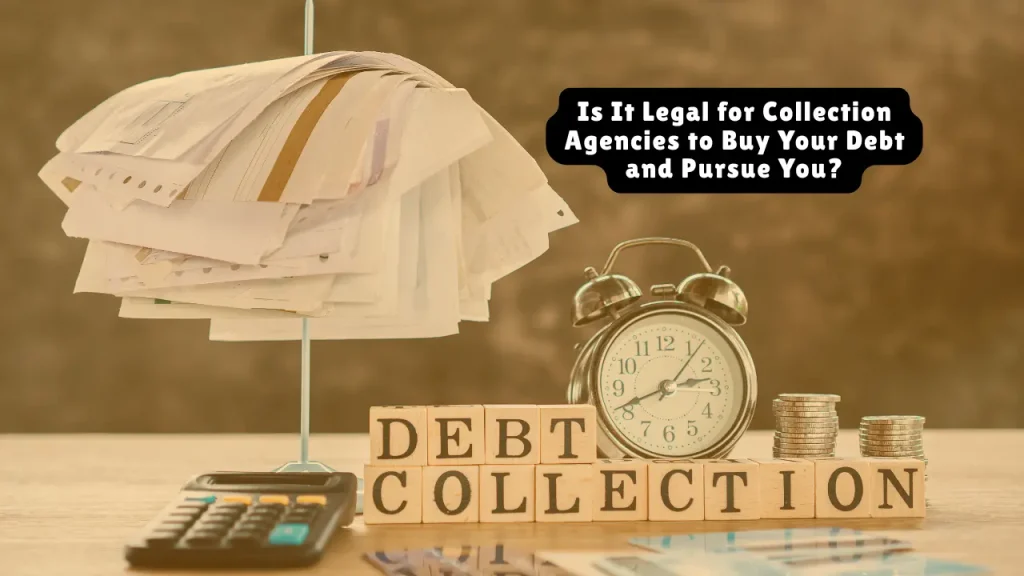Is It Legal for Collection Agencies to Buy Your Debt and Pursue You?
Yes, it is legal for collection agencies—known as debt buyers—to purchase delinquent debts and pursue repayment. However, their actions are tightly regulated under the Fair Debt Collection Practices Act (FDCPA) and relevant state laws. Consumers retain critical rights throughout the process.
Table of Contents
How Debt Buying Works
From Charge-Off to Sale
When a debt becomes 90–180 days overdue, the original creditor—such as a bank, hospital, or credit card issuer—may charge off the balance and sell it at a significant discount to a debt buyer. For example, a $1,000 debt may sell for as little as $40–$70, depending on collectability.
What Happens Next
Once the debt is sold:
- Debt buyers become the legal owners of the debt.
- They may collect directly or assign the task to third-party collection agencies.
- The debt buyer profits by collecting the full balance (plus allowable interest/fees) while having purchased the debt for a fraction of its value.
| Type of Collector | Role | Legal Authority |
| Debt Buyer | Owns the debt | Can report to credit bureaus and sue in court |
| Third-Party Agency | Hired to collect on behalf of owner | Cannot sue (unless also a licensed debt collection law firm) |
| Original Creditor | Lends money/services | Not bound by FDCPA; retains more collection leeway |
The Legal Framework: FDCPA & State Protections
The FDCPA (15 U.S. Code § 1692) establishes national protections against abusive collection tactics. Highlights include:
- No harassment: Prohibits threats, profane language, and repeated calls.
- No misrepresentation: Agencies cannot falsely pose as law enforcement or misstate the debt amount.
- Call restrictions: Prohibited from calling before 8 a.m., after 9 p.m., or at work if you’ve requested no contact there.
- Cease-contact rights: You can send a letter demanding no further contact (except for legal notices).
Important Case Law:
- Henson v. Santander (2017): Debt buyers collecting their own purchased debt may not fall under FDCPA’s definition of a “debt collector,” reducing protections in some jurisdictions.
- Rotkiske v. Klemm (2019): The statute of limitations for FDCPA claims begins at the time of the violation, not when it was discovered.
Related article: Do You Still Owe If Your Debt Is Sold?

Your Consumer Rights When Debt Is Sold
1. Validation Rights
You have 30 days from first contact to request written proof of debt, including:
- Original creditor details
- Amount owed
- Chain of ownership
If the agency fails to provide this, they must stop collection efforts.
2. Disputing Inaccuracies
You can dispute:
- Zombie debt: Debts beyond the legal statute of limitations (varies by state)
- Incorrect amounts or debts not legally yours
Collection efforts must pause while disputes are investigated.
3. Cease-and-Desist Letters
Send a certified letter requesting no further contact. Agencies can only contact you to:
- Confirm they’ve stopped
- Notify you of impending legal action
State-Specific Statutes of Limitation
| State | Key Protection | Limit |
| Texas | No wage garnishment for consumer debts | 4 years |
| Maryland | Debt collectors must be licensed | 3 years |
| Pennsylvania | Unpaid collections removed from credit reports | 4 years |
After expiration, debts become time-barred—they can still request payment, but cannot sue. However, making a payment or acknowledging the debt may legally restart the clock.
Critical Risks to Avoid
1. Resetting the Statute of Limitations
Any payment, promise to pay, or written acknowledgment can revive an expired debt, exposing you to legal action.
2. Credit Score Impact
Delinquent or collection accounts remain on your credit report for seven years from the original delinquency date. This affects loan approval, interest rates, and insurance premiums.
3. Lawsuits & Judgments
If you’re sued:
- Do not ignore the summons.
- Failing to respond can result in a default judgment, leading to bank levies or wage garnishment where allowed.
Best Practices to Protect Yourself
| Action | Why It Matters |
| Request Debt Validation | Forces collector to prove debt ownership and amount |
| Send Cease-Contact Letter | Legally stops harassing communication |
| Check Statute of Limitations | Avoid reviving old debts with payments |
| Dispute Inaccuracies | Eliminate wrongful claims from your credit and liability |
| Negotiate Settlements | Settle for 30–50% of the original amount—get it in writing |
| Respond to Lawsuits | Prepare a defense or counterclaim for FDCPA violations |
💡 Stat: Up to 60% of sold debts contain errors or outdated information. Always demand a full audit trail before agreeing to anything.
How to Report or Sue Collectors
If Your Rights Are Violated:
- File a complaint with:
- Consumer Financial Protection Bureau (CFPB)
- Federal Trade Commission (FTC)
- Your State Attorney General’s Office
- Consumer Financial Protection Bureau (CFPB)
- File a lawsuit under the FDCPA:
- Consumers can recover up to $1,000 plus attorney’s fees for each violation.
Final Word
Buying and collecting debt is legal—but harassment, deception, and unlawful lawsuits are not. The law is on your side, but only if you assert your rights, stay organized, and act quickly. Always document interactions and consider seeking legal advice—many consumer attorneys offer free consultations.
Key Takeaway:
Don’t panic. Don’t ignore. With the FDCPA, state law, and strategic engagement, you can validate, challenge, negotiate, or defend—on your terms.
About the Author

Sarah Klein, JD, is a former consumer rights attorney who spent years helping clients with issues like unfair billing, product disputes, and debt collection practices. At All About Lawyer, she simplifies consumer protection laws so readers can defend their rights and resolve problems with confidence.
Read more about Sarah
